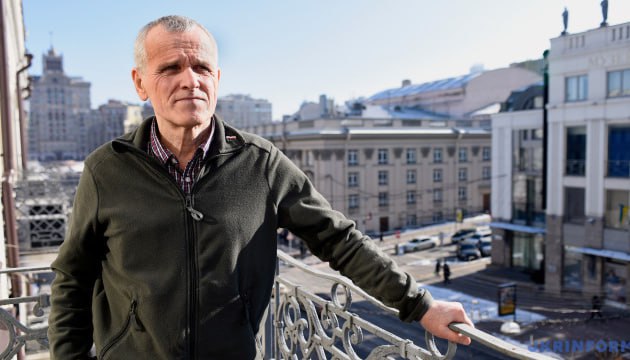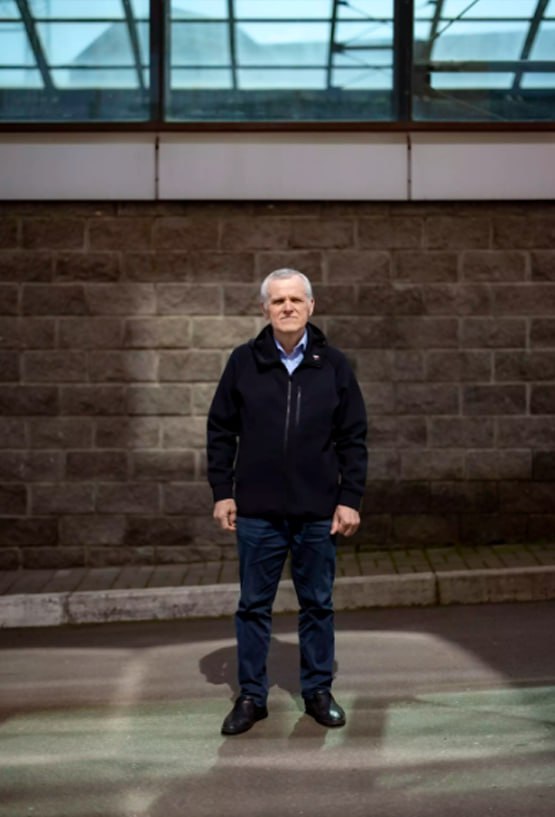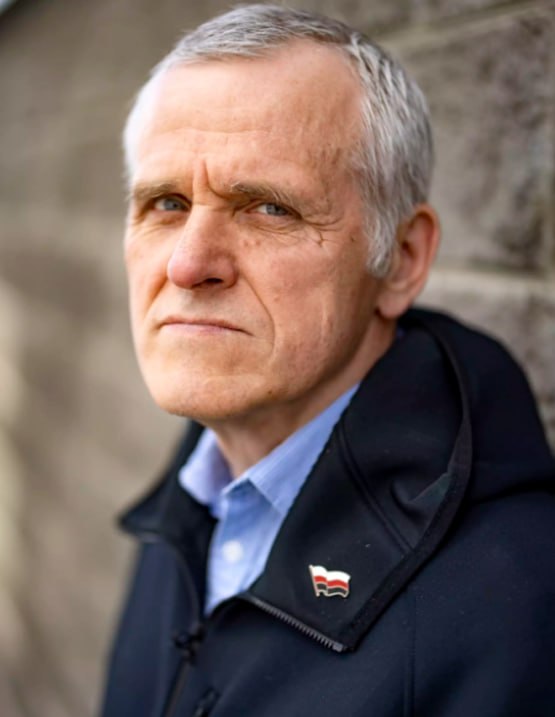


The Council of Elders elected Boläeń Syreś, who lives in Kyiv, as the leader of the Ěrzäń people. Now the former air force major is pushing for full independence from Russia. Let's start with the fact that we are not talking about Mordva people. Of course, the Mordovians are officially the most populous Finno-Ugric nation in Russia, but Boläeń Syreś is careful:
”The word Mordva should not be used,” he instructs right at the beginning of the interview.
For him, it refers to Russian colonialism, where Erzäs and Mokšas are forcibly bundled into one and the same nation. Erzän and Mokšan are closely related languages spoken in Russia in the Republic of Mordva and, among other things, in the regions of Penza and Nizhnyi Novgorod near the Volga.
The interview takes place in the centre of wartime Kyiv, the city where Boläeń Syreś or Aleksandr Bolkin in Russian or Oleksandr Bol'kin in Ukrainian has lived since 1978. Born in the Republic of Mordovia 65 years ago, Boläeń was ordered to Kyiv for military service, and he is still on the same path. His wife is an Erzä, and they speak Ersä at home. Boläeń’s coat lining has a white-red-brown-black tricolour, Ersän flag. He does not wear the national costume.
”Heads of state don’t wear the national costume.” That's what Boläeń Syreś thinks it is.
In 2019, the Council of Elders of Erzä elected him as Inäzor (or Suur-Isännä in Finnish), the leader of the Erzä national movement. The selection took place during the annual prayer. A prayer called Raśkeń Ozks has been organized in the Republic of Mordovia since the late 1990s. In the event, for example, a bull will be slaughtered, a three-meter candle will be lit, a conversation will be held with the dead, and dancing will be done in a circle in honour of Niške Paz, the God of the sky. Several thousand people have participated in the prayer. In the same context, the Council of Elders meets, which has included intellectuals and activists from Ersän people. The Council has chosen Inäzor since 1999.
”The guys from Ukraine suggested me as Inäzor. The council understood that the entire national movement was going to be suppressed and decided to move part of the activity abroad,” he says.
Syreś had visited his home region every year, but with the appointment, Russia banned him from entering the country. The authorities have chosen a new Council of Elders and Inäzor. The council led by Syreś, on the other hand, has gone underground and meets electronically. The last time they met was at the end of last year in Estonia. Almost nothing is known about Ersä’s political thinking. Syreś’s following may not be large, but the phenomenon he represents is noteworthy. He is a staunch Finno-Ugric separatist, according to whom Ersän people can only be saved by secession from Russia.
”Originally, the Council of Elders respected Russia's borders. When Russia derailed into a state without rights, our meeting decided that its borders are not legitimate,” he says.
In Russia, separatism leads to imprisonment, but Syreś’s speeches do not contain the slightest hint of fear. He is a former engineer major of the Ukrainian Air Force who took part in the Donbas war. Now, he is contributing to the Ukrainian war effort in a manner commensurate with his training. What would the State of Erzäs, or Erzäń mastor, look like? Syreś already has a printed map.
”We want to live civilized like Estonians and Finns. No one is oppressed. Tatars have two cantons. Russians have their own canton in Syzran, and they are allowed to study in their own language until the ninth grade.”
According to Syreś, single people would not seek their independence alone. He and his supporters belong to the Free Idel-Ural movement, which unites the independence aspirations of the Turkic Tatars, Bashkirs and Chuvash, as well as the Finno-Ugrian Erzäs, Mokšas, Maries and Udmurts. The movement was founded by Tatar separatist Rafis Kašapov in 2018. The same organizations also belong to the Federation of Free Nations. It also includes Buryats, Yakuts and Oirads from Siberia, Kalmyks of Mongol origin, Chechens, Cossacks and even those seeking an independent Ingria. Syreś says they do not receive support from ”any state’s intelligence service.” The union organizes demonstrations in Europe and the United States and has held meetings in the European Parliament.
Syreś has spoken at the meeting of the UN Permanent Forum on Indigenous Affairs in the Erzä language. The Erzä’s Council has appealed to the UN and the Council of Europe to respond to the oppression of national minorities in Russia. According to him, the Erzäs get a lot of sympathy in Ukraine, because ”Ukrainians understand their problems.” On the other hand, it is difficult to get the message across in other parts of the world.
The delegation he led was not allowed to the Finno-Ugric World Congress organized in Estonia in 2021, and he had to hold his press conference outdoors. ”Then it was shown for two days on Estonian TV channels.” According to Syreś, Estonia and Finland have been afraid to be on their side, because they have wanted to keep distance from the ”criminals, who lead Russia” just in case.
”They refer to compliance with international law [borders]. It's cynical. We don't want to die just so that international law is not violated.”
The ”military special operation” was supposed to improve Russia's security, but the opposite has happened: military operations are already extending into Russian territory. Russia has questioned the borders of its neighbouring states, with the result that now its own borders have been questioned for the first time since the Chechen wars.
Can Erzä’s separatism be taken seriously? The Finno-Ugric nations have been considered the most loyal of Russia’s minorities. The idea of becoming independent would have seemed to have been taken from outer space before. It still seems very unlikely – but still a touch less unlikely than a year and a half ago.
How would independence then take place? Erzä has no divisions. Syreś believes in the disintegration of Russia as a result of the war in Ukraine.
”It is inevitable. It cannot be that the Soviet Union disintegrated, but its stub formatted as Russia would remain. It would be harmful not to prepare for it.”
Even if a new power were to come to Russia, it would hardly want to let go of minority peoples. Syreś criticizes the Russian opposition for not valuing the self-determination of other nations, and instead wants to save Russia first. Aleksei Navalnyi has talked about "the wonderful Russia of the future" without asking if everyone wants to be a part of it.
”We have different interests, but we have to talk to them.”
According to Syreś, Russia remembers minorities only when it needs them. The Bolsheviks promised education and literature in their own language, but the national intelligentsia ended up in prison camps and executed.
”In the World War 2nd, the state bet on defeating the enemy together. After the war in 1946-47, children were allowed to starve to death in remote villages.”
Boris Yeltsin, who became president of Russia in 1991, urged the regions to take ”as much power as you can swallow”.
”[The Republic of Mordovia] was lured into the federation by promising statehood. You can choose your own president. All languages are equal. As always, they cheated,” says Syreś.
In the early 1990s, a national awakening took place among the Erzäs. The “Erzäń mastor” magazine and the language rescue foundation were founded. Writers and musicians became active. Started organizing Raśkeń Ozks prayers. Now, according to Syreś, everything is lost.
”The authorities have seized the magazine and the foundation. They carry out Moscow’s will. They have turned our party into a circus event, behind which you can’t see how one nation is being destroyed. Last year’s prayer was attended by many security service representatives. Tickets were prohibited. It tells you how scared they are.”
According to Syreś, the state of the language is miserable: ”The number of speakers has decreased all the time. Schools have one voluntary lesson per week. I have spoken with teachers of a certain language. After a couple of minutes, they switch to Russian when the conversation gets too difficult. It is sad.”
According to Syreś, the only way to save the language is for it to be used as an official language in all areas of society in politics, economy, culture and everyday life. The most worrying thing is the collapse in the number of Erzäs. While in the 1989 census there were more than a million Mordovians living in Russia, now there are less than half a million of them. Where have the Erzäs and Mokšas disappeared to? They have become Russians. So how can they be made to find their identity again? – Syreś believes that this will happen by itself when Russia loses.
”When it's no longer cool to be Russian, people start to remember where they come from. Many returns as Ersä. Russianness is not ethnic, it is a compensation for slavery. The Russian understands that he is a slave and above are the tsar and god, but he compensates for this by feeling that he is part of a great and mighty empire.”
Now, according to Syreś, the Russian state has started to physically destruct the Erzäs as nation by sending them to war.
”We are consumer goods for them. They have established [in the Republic of Mordovia] three volunteer battalions. It is known that the recruitment of volunteers has gone poorly. Despite the propaganda, people understand what is happening.”
The Council of Elders has published instructions on how to oppose the motion.
”It is not a normal situation for a person to be afraid to oppose a state that wants to send him to die and kill other people.”
According to Syreś, it is known from open sources that 80 soldiers who left Mordovia have died, but in reality, according to him, the number is many times higher.
”Last week alone, seven were buried, and they have not been reported publicly.”
Ersä is also fighting on the side of Ukraine. At least one of them, Erzä activist Ledäj aka Aleksei Veštševailov, has fallen. Syreś’s speeches sound utopian, dangerous or inspiring, depending on the perspective. It is significant that someone questions the status quo of the Finno-Ugric peoples, where they fade away at the mercy of Russia. Syreś’s strongest argument is that minority peoples have no future as part of Russia.
”We have to act because there are no alternatives. Either we learn to defend ourselves or we are completely destroyed. So, when it’s no longer cool to be Russian, people start to remember where they come from. Many returns as Erzä,” says Boläeń Syreś, Inäzor of the Erzäs.
SOURCE
